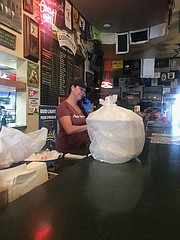Lawmakers hope to avoid closing time
Idaho and Montana might be neighbors, but for the moment, the two states aren’t drinking buddies.
The states’ two governors handed down plans last week for re-opening their economies after the coronavirus forced them to close or heavily curtail businesses from Boise to Billings and beyond. While most components of their plans align with one another, an industry opening on two entirely different timeframes is the business of the corner hangout.
Idaho Gov. Brad Little’s plan to re-open the state is a four-stage operation intended to gradually expose businesses and residents to fresh air. Starting Friday, the first stage opens churches and daycares. Second comes restaurant dining rooms, gyms and salons and small gatherings. Third comes larger gatherings and non-essential travel. The fourth and final stage, starting June 13 — assuming the public recovers smoothly — allows visits to movie theaters, senior living facilities and bars.
This is notably different than our neighbor to the east.
Montana Gov. Steve Bullock, a Democrat, announced last week a three-pronged plan to open “Big Sky Country” starting May 4. Only his plan opens bars first. Taverns have been such a focus of economic concern for the state that two of Montana’s Congressmen — U.S. Rep. Greg Gianforte and U.S. Sen. Steve Daines — successfully lobbied to get bars and taverns included in the next wave of federally guaranteed Paycheck Protection Program loans.
“Small businesses across Montana have been shut down as we confront the coronavirus outbreak,” Gianforte said, “and the Paycheck Protection Program has been a critical lifeline to Montana workers and small businesses. (This) announcement ensures that all bars and taverns in Montana have access to the resources they need to pay workers now and re-open their doors...when this crisis passes.”
Some establishments in North Idaho remain open thanks to their curbside service. Johnny French of CaddyShack in Coeur d’Alene said his popular golf-themed restaurant is still hanging on despite Idaho’s economy currently deep in the rough.
“We’re doing all right,” French said. “We’ve been relying on our regulars to help us out. They’ve been showing up every day; if it wasn’t for them, I don’t know what we’d be doing.”
Restaurants like CaddyShack will be at a greater advantage to open than bars or taverns, as the company’s model focuses on food while still being able to provide a drink. The general manager of CaddyShack praised two of Little’s decisions: not only for loosening restrictions to sell to-go alcoholic beverages, but also for his decision to open the state cautiously.
“We all want to get back to normal,” French said, “but I was pleased to see the Governor is not making any rash decisions and jumping the ball too soon.”
Rep. Jim Addis said he knows several tavern owners in town — “Take that as you will,” he joked — and that while citizens across North Idaho’s business spectrum reached out to voice their concerns over the economic future of the state, not one bar owner has reached out to lobby for a policy change.
“I’ve talked to a lot of them, and they’re discouraged — very discouraged — but they’ve been very understanding,” Addis said. “They realize they’ve had to do the right thing.”
That said, Addis said he’s broken-hearted by how the coronavirus has slaughtered businesses.
“Make no mistake: I am extremely pro-business, and it pains me to see this happening to businesses right now,” he said.
Not all have praised Little’s move.
Rep. Ron Mendive of Coeur d’Alene said Little’s March 25 order was unconstitutional, and that bars and taverns won’t be the only ones to feel it.
“Some bars are more solvent than others, just like any other business,” Mendive said. “It really depends on how these businesses were doing financially before this all started. You take some that are struggling, and suddenly, you close their doors for two months? Whether or not they’ll be able to survive this, I’m afraid some will not.”
Mendive stressed, however, that COVID-19 is a serious and contagious disease, and that it’s up to the people and individual bars to keep patrons safe.
While The Press didn’t speak to a single bar owner or manager who expressed anything other than support of Little’s decision, it’s worth noting many bars closed down entirely because of the order. Sunset Bar on Appleway, for example, said it felt it was its civic duty to temporarily shut down.
“After careful consideration, we at the Sunset have decided it is our moral obligation to temporarily close...We ask for your understanding in this matter,” Sunset management wrote March 19 on its social media platforms.
A previous version of this story incorrectly listed CaddyShack as a bar or tavern. The Prairie Avenue establishment has been a restaurant since 1998.



